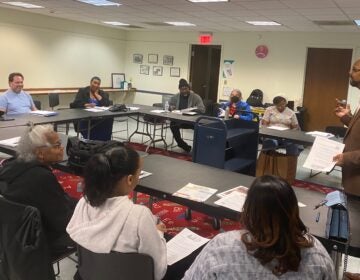Fringe Festival play gets to the core of the Philly riddle
If city-dwellers are interested in their own social and economic development, why do they dump trash in their streets? Given the state of many neighborhoods, why should developers engage the residents?
Those are among the provocative, relevant questions posed by COSACOSA’s one-day-only Philadelphia Fringe Festival offering.
The Estate of Real: Changing Philadelphia Neighborhoods was performed three times Saturday at COSACOSA’s studio at 4427 Main St., Manayunk.
Kimberly Niemela, director of the public art organization, says she did not author the interactive performance’s script so much as “congeal” it from interviews with COSACOSA’s neighborhood partners involved with its 20-year “Change in the Making” program.
Improvisation from two passionate and animated performers, Bruce Robinson and Sharnae Mask, also shaped the show. Mask, who provided the photography used in the performance, also serves as COSACOSA’s program manager.
The performance, whose dialogue debates themes such as health, crime, home ownership and economic opportunity, moved throughout the small studio and used highly evocative images from Philadelphia neighborhoods as a jumping-off point.
A host of tough questions
Two real estate agents, Amelia Rayshon (Mask) and D. Zaster (Robinson), argue the merits of unbridled corporate development and the true causes of littering, obesity, crime and poverty.
Do street-side shrines to shooting victims help to heal residents’ grief, or do they normalize violence?
Do community art projects promote positive common values, or are they simply beautification that fails to make money or create jobs?
Why are families who have owned a home for generations driven out by rising property taxes while brand-new developments get large tax breaks?
Why should we put more money into our education system, when its problems are so obvious?
“Community is key,” says Amelia Rayshon in the play. “Profit will prevail,” D. Zaster insists.
The piece has two different endings, and audience members’ responses determined which one was performed each time.
When it comes to common city problems like poor health or trash dumping, it’s tempting to blame “unproductive, irresponsible members of society” who have simply made bad food choices.
But in truth, “it goes deeper than that,” said Niemela. “What are the underlying reasons for these problems?” Everyone must take some responsibility for the state of his or her community.
In line with COSACOSA’s mission of positive social exchange, Niemela’s ultimate goal for the piece is that audiences will use the performance to enter a lasting dialogue with each other about positive local change.
Robinson and Mask are equally passionate about the show’s message.
“Where do people put their personal power?” Mask asked. “People need to know what’s going on in the city.”
“Philadelphia has potential,” said Robinson, if its residents become engaged and informed. To him, a major goal of the performance is to promote a kind of critical thinking that has become “devalued” in our society, as we rely on glib slogans instead of informing ourselves to face difficult choices.
Countering polarization
Niemela crafted the performance to give weight to each side of the arguments.
“Everything is so polarized these days,” she said, noting that it is possible, even necessary, to focus on the similarities between neighborhoods instead of their differences.
Now this year’s brief Fringe run is over, Niemela envisions building a film project out of the show to bring the conversation to local schools.
For more information, visit cosacosa.org or call 215-385-2554.
WHYY is your source for fact-based, in-depth journalism and information. As a nonprofit organization, we rely on financial support from readers like you. Please give today.




